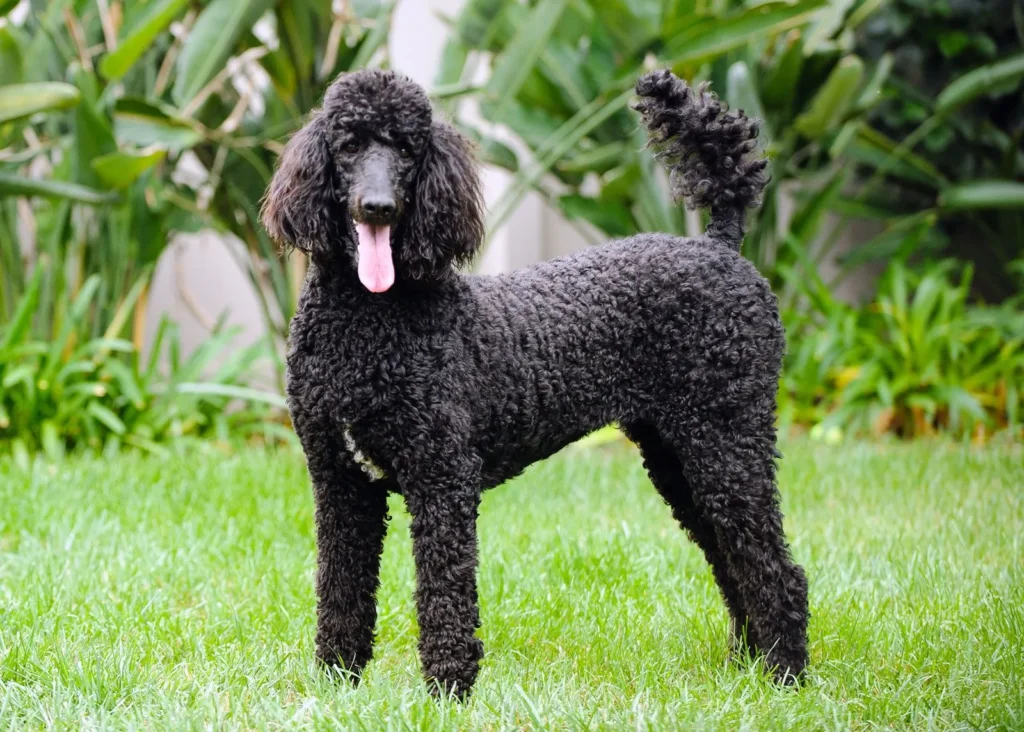
Table of contents
- Introduction
- History and Origin of the Poodle
- Poodle Varieties and Sizes
- Appearance and Coat Features
- Temperament and Personality
- Training and Intelligence
- Exercise and Activity Needs
- Grooming and Coat Care
- Health and Lifespan
- Nutrition and Diet Tips
- Socialization and Family Life
- Finding and Adopting a Poodle
- Living With a Poodle
- Poodle Mixes and Hybrids
- Cost and Budgeting for a Poodle
- Common Poodle Myths
- Traveling With Your Poodle
- Conclusion
Introduction
Poodle dogs combine elegance, intelligence, and a loving nature in one package. They suit families, singles, and active pet lovers. This guide covers history, traits, care, training, and adoption tips. We keep language clear, simple, and direct for easy reading. You will find valuable tips to make your Poodle life smooth.
History and Origin of the Poodle
The Poodle’s roots reach back to 15th-century Germany. Hunters bred them as water retrievers for game birds. Their dense coat helped protect joints in cold water. By the 18th century, the Poodle moved to France. French circus performers admired their intelligence and grace. Groomers crafted signature clips to protect key body parts. The breed soon became a symbol of French nobility. Royalty and the aristocracy adored the Poodle’s sharp wits. Breeders refined the coat and size for show competitions. The breed’s global popularity grew through dog shows and media.
Poodle Varieties and Sizes
Poodles come in three popular size varieties:
| Variety | Height (at shoulder) | Weight Range |
|---|---|---|
| Standard | Over 15 inches | 40–70 pounds |
| Miniature | 10–15 inches | 15–17 pounds |
| Toy | Under 10 inches | 4–6 pounds |
Each size shares the same bright, friendly personality. Standard Poodles suit active families with large yards. Miniature Poodles work well in condos and apartments. Toy Poodles offer pocket-sized charm for city dwellers. Size choice depends on your living space and habits.
Appearance and Coat Features
Poodle coats resist shedding and trap loose hair. Their dense curls come in white, black, apricot, and more. Some Poodles sport blue, red, or silver coats. Their coat texture can be corded, curly, or loose. Eyes remain dark and oval, with an alert gaze. Ears hang close to the head, covered in long hair. Their body build shows balance and refined muscle. Groomers shape the coat in styles like the Continental clip. Regular trims highlight the Poodle’s elegant frame.
Temperament and Personality
The Poodle shines with intelligence and affectionate charm. They bond deeply with all family members. This breed adapts to homes, apartments, and active farms. Poodles stay vigilant and make alert watchdogs. They greet strangers with cautious curiosity and calm. These dogs thrive on play, cuddles, and mental games. They love to learn tricks and earn praise. A bored Poodle might chew or dig to pass time. Provide toys and puzzles to keep them busy. Poodles offer loyalty, laughter, and loving companionship.
Training and Intelligence
Poodles rank among the world’s smartest dog breeds. They master new commands in just a few repetitions. Use positive reinforcement like treats and verbal praise. Keep training sessions short—five to ten minutes each. Focus on one command per session to avoid confusion. Early socialization sets them up for friendly manners. Introduce your Poodle to various sights, sounds, and people. Enroll in puppy classes for structure and social play. Gradually increase distractions to build strong focus. Challenge their mind with advanced tricks and scent games.
Exercise and Activity Needs
Poodles need regular exercise to stay fit and happy. Plan at least 30 minutes of daily walking or jogging. Include play sessions like fetch, tug, or frisbee. Agility courses suit their athletic build and sharp mind. Swimming taps into their water-retriever heritage. Puzzle toys and treat games provide mental workouts. Rotate toys to keep their interest high. Break longer workouts into multiple short sessions. Monitor weather—avoid long runs in extreme heat. Adjust intensity based on your Poodle’s age and health.
Grooming and Coat Care

Poodle coats require regular care to prevent mats. Brush the coat at least three times per week. Use a slicker brush or metal comb for best results. Schedule professional trims every six to eight weeks. Clip the coat in styles like Puppy, Continental, or Sporting. Clean ears weekly to avoid wax buildup and infection. Check ear canals and hair for tangles and debris. Brush teeth daily or at least four times weekly. Trim nails every two to four weeks to avoid cracking. Bathe your Poodle every three to six weeks with a mild shampoo.
Health and Lifespan
Most Poodles live 12 to 15 years when well cared for. They enjoy overall good health but face some risks.
- Hip dysplasia: Get hip X-rays for breeding dogs.
- Addison’s disease: Watch for fatigue and appetite loss.
- Epilepsy: Report seizures promptly to your vet.
- Progressive retinal atrophy: Book yearly eye exams.
- Thyroid issues: Test thyroid levels if weight fluctuates.
Maintain annual vet visits for vaccinations and checks. Feed a balanced diet to support long-term health. Keep your Poodle at a healthy weight to ease joints. Provide dental cleanings to prevent periodontal disease.
Nutrition and Diet Tips
Feed your Poodle high-quality dry kibble or fresh food. Aim for at least 20 percent protein content. Divide meals into two or three portions per day. Adjust portions for age, size, and activity level. Offer fresh water 24/7 to keep them hydrated. Consult your vet before introducing new supplements. Avoid feeding table scraps to prevent weight gain. Use slow-feed bowls or puzzles to slow overeating. Monitor body condition and adjust food as needed.
Socialization and Family Life
Poodles thrive on family interaction and social outings. Start socialization when they are just eight weeks old. Invite friends and neighbors to your home gently. Supervise puppy playdates to teach proper manners. Enroll in puppy preschool for structured learning. Rotate playmates to expose them to varied behaviors. Praise calm reactions to loud noises and crowds. Introduce other pets gradually to avoid stress. Teach children to respect your Poodle’s boundaries. Reward gentle handling to build trust with kids.
Finding and Adopting a Poodle
Choose a breeder who tests for health clearances. Ask for CERF eye exams and OFA hip certificates. Visit the breeder’s home to assess puppy social skills. Observe parent dogs for stable temperament and structure. Ensure your breeder provides a written health guarantee. Consider adopting from a Poodle rescue or shelter. Adult Poodles often come house-trained and tested. Rescues provide valuable history on behavior and health. Prepare your home with supplies before your Poodle arrives. Arrange a vet visit within the first week of adoption.
Living With a Poodle

Poodles adapt to many living environments. They suit city apartments with daily exercise. They thrive in suburban homes with fenced yards. Provide a quiet crate or bed as a safe retreat. Keep them indoors—they crave close family contact. Use baby gates to manage their access to rooms. Offer regular outdoor breaks to relieve stress. Plan for potty training with consistent cues and praise. Create a grooming station for regular maintenance. Rotate toys and chews to keep them engaged.
Poodle Mixes and Hybrids
Poodle crosses have grown extremely popular in recent years. Notable mixes include Labradoodle, Goldendoodle, and Cockapoo. These hybrids often inherit low-shedding coats and bright minds. Their size varies based on the Poodle parent’s size. Genetic traits can differ even among littermates. Research both parent breeds for potential health issues. Choose reputable breeders who test for clearances. Hybrids may need the same grooming routine as purebreds. Meet both parents to gauge likely temperament and size. Prepare for possible varied energy levels in Doodle mixes.
Cost and Budgeting for a Poodle
Owning a Poodle carries initial and ongoing costs.
Initial Expenses:
- Puppy purchase or adoption fee ($1,500–$3,000).
- Spay/neuter surgery and vet check ($200–$500).
- Essential supplies: crate, bed, bowls, leash ($200–$400).
Ongoing Costs:
- Food and treats ($500–$800 per year).
- Grooming visits ($600–$1,200 per year).
- Annual vet visits and vaccinations ($200–$400 per year).
- Pet insurance or emergency fund ($300–$600 per year).
Plan for possible health emergencies or specialized care. Set aside a pet fund for extra training and classes.
Common Poodle Myths

Myth: Poodles only suit fancy lifestyles. Truth: Poodles adapt to many homes and routines.
Myth: All Poodles have fussy grooming needs. Truth: Regular care keeps the coat healthy and mat-free.
Myth: Poodles bark constantly and annoy neighbors. Truth: With proper training, Poodles remain calm and quiet.
Myth: Poodles can’t live with other pets. Truth: Early socialization helps them accept other animals.
Myth: Poodles need constant pampering. Truth: They thrive on routine, structure, and loving care.
Traveling With Your Poodle
Poodles travel well with proper prep and planning. Use a secure, size-appropriate travel crate or carrier. Line the crate with familiar bedding and a toy. Pack food and water in spill-proof containers. Take breaks for bathroom and leg stretching on road trips. Research pet-friendly hotels and airline rules in advance. Carry vet records and vaccination certificates on trips. Use a sturdy leash and harness for safety during walks. Offer treats to reduce travel stress and reward calm behavior.
Conclusion
The Poodle dog breed offers beauty, brains, and endless loyalty. This guide equips you to choose, train, and care for your Poodle. Follow these tips on grooming, health, and lifestyle routines. Your Poodle will reward you with years of joy and friendship. Start your journey today with a smart, devoted companion.
Read More Articles:
- Top 10 Best Dog Breeds for Kids – Family-Friendly Guide
- Best Dog Breeds to Own – The Most Friendly
- Best Dog Breeds for Kids: Your Top 10 Ultimate Family Guide
Reference also: Wiki

